
Research Voyage
Research Tips and Infromation

How to Present PhD Progress Report to Doctoral Committee Members in 03 Simple Stages

As I reflect on my journey through the challenges and triumphs of presenting my PhD progress to the doctoral committee, I’m reminded of the invaluable lessons learned and the transformative experiences gained along the way.
1. Diverse Committee Composition: From the outset, the composition of the doctoral committee struck me with its diversity—comprising experts from within and outside my university, each member brought a unique perspective and wealth of knowledge to the table. Their ability to seamlessly map my research problem to their respective domains underscored the richness of their insights and the importance of their feedback in shaping the trajectory of my study.
2. Thorough Preparation: Meticulously crafting my presentation was only the first step. I realized the necessity of thorough preparation, ensuring that each slide effectively communicated my research objectives, methodology, preliminary findings, and future directions. Despite the initial nerves, I remained composed and focused, drawing upon months of dedication and hard work invested in my research.
3. Anticipating Diverse Requests: During one particularly memorable meeting, the committee members had varied requests—one member asked for a demonstration of my work, while another member wanted to delve into the intricacies of my data collection, cleaning, and wrangling process. These diverse requests underscored the importance of being prepared for any eventuality during the presentation, including the need for live demonstrations and detailed explanations of data-related processes.
4. Embracing Constructive Criticism: I welcomed the committee’s feedback with an open mind. Their constructive criticism and encouragement not only bolstered my confidence but also reignited my passion for my work. I learned to recognize the invaluable role of feedback in guiding the next steps of my research journey.
5. Displaying Previous Meeting Observations: One valuable lesson I learned along the way was the importance of displaying and addressing previous committee meeting observations in subsequent presentations. It was during my second presentation that one committee member suggested this approach, highlighting the need to showcase how suggestions were addressed and incorporated into the research progress. From that point onward, I made it a regular practice to include this information in my presentations, ensuring transparency and accountability in my research journey.
In retrospect, each PhD progress presentation was a transformative experience, shaping me into a more resilient, prepared, and adaptable researcher.
As I reflect on the journey of presenting my PhD progress, I invite you to join me in exploring the intricacies of navigating these pivotal meetings. From preparation to presentation, and from feedback to refinement, each step of the journey offers valuable insights into the art and science of doctoral progress presentations.
Introduction
Summary of plan of actions before phd progress presentation meeting, presentation tips, summary of plan of actions during phd progress presentation meeting, summary of plan of actions after phd progress presentation meeting, email template to doctoral committee members for extension or modification for the work proposed, mastering the art of oral and visual presentations for phd presentations, what should be included in the one-page summary for phd doctoral committee members, how can i effectively demonstrate a software-based project during the phd progress presentation, what level of detail should i include in the background section of my presentation, how can i ensure that there are no surprises for my supervisor during the doctoral committee meeting, what types of questions can i expect from the committee members regarding my research plan, how should i respond to suggestions and feedback given by the committee members during the meeting, under which circumstances phd progress presentation can be rejected.
The PhD Doctoral committee is constituted by the university in which the candidate has registered for PhD. The committe is there to support and guide the research scholar till his final thesis is submitted. The committe involves the experts in the domain of the candidate from various universities and research labs. The Committee will evaluate your progress and help to make sure that you are on track to get your dissertation within a reasonable time.
At the beginning of your research, their focus will be on making sure you have defined reasonable and achievable objectives. Later, they will help you decide when it is time to write your thesis. Finally, they will be there at your thesis seminar and defence presentations. Their support as mentors will likely continue as you move on in your career.
Doctoral committee meeting happens usually once in 06 months. Here it is expected that the research scholar has to present his PhD progress work of the past six months. The meeting should not be felt like an exam. The outcome should be productive advice to you for your future research.
The Presentation of PhD Progress Report to Doctoral Committee Members happens in three stages namely: i) Before the meeting: i.e. Once you start preparing the report for the meeting to till the meeting begins. ii) During the meeting: i.e. From entering into the meeting hall to till the meeting gets over and iii) After the meeting: i.e. From the time meeting concludes to till the next six months before you really start preparing for your next meeting report.
Before the PhD Progress Presentation Meeting

Along with your supervisor go through all the comments given in the previous PhD progress doctoral committee meeting. Discuss in detail with your supervisor the work carried out for the past six months. If any issues are still pending have justification for not addressing or partially addressing those issues.
Do not hide details regarding the implementation and pending issues with your supervisor. This actually helps the supervisor to defend you and take inputs from the committee members regarding the future course of directions.
A summary of PhD progress and plans should be prepared and submitted to the Doctoral committee at least one week prior to the meeting. Make sure that you have gone through the report with all grammatical corrections and plagiarism checks.
Send out the agenda to your committee members beforehand, but also remind them of the topics you want to cover before you begin the presentation. If you have any manuscripts published or accepted send your committee a copy of the same.
You should prepare a PhD progress presentation (no more than 20 minutes without interruption) that includes a brief background of your research, objectives and the work carried out from the last presentation to till date. Without fail discuss in detail the presentation slides with your supervisor. In your presentation slides list all the previous comments and your response for each committee in the form of a table.
If you are planning to change the title of your work getting consent from the committee members is essential. Have at least 04-05 titles which you and your supervisor feel appropriate beforehand. This will ease the process of changing the title immediately in the meeting and the committee can recommend the same to the university along with regular suggestions.
The best way to ensure that your PhD progress meeting goes smoothly is to meet individually with each committee member to discuss your results well in advance. If you cannot meet with them in person, share your results ( refer my blog on how to write result section ) over email and ask for their feedback. If there are any disagreements, resolve them before the meeting by speaking with your supervisor to ensure that the meeting goes smoothly.
During the PhD Progress Presentation Meeting

Before the start of the PhD progress presentation give copies of the one-page summary to other faculty members who are attending the session. Submit copies of the complete report to the committee members including your supervisor. No need to present details of any published work. Provide a reprint or preprint, preferably ahead of the meeting. If your work is software based then keep the demo ready. If you do not have a working module then show the video demonstration of the model. This will help the committee members to suggest future directions for your work.
During your PhD progress committee meeting, you should focus on the last six months’ work rather than the background. Only spend as much time on the background as is relevant to what you will be talking about.
There should not be any surprise slides/facts to your supervisor during your committee meeting.
At your first PhD progress Doctoral committee meeting, you will present an outline of your plan for your research. You can build a detailed description of what you plan to do ( literature survey to carry out, algorithms or theorems to study, experiments to carry out, software and hardware components to add, systems integration to perform, tests to accomplish ). The plans can be represented with specific milestones and timelines with a Gantt Chart .
Example: The sample Gantt chart below shows a set of activities planned for the next few months for the Research work. This can be extended to any length. This chart helps the committee members to know how well the researcher has planned the research activities.
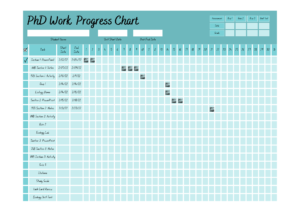
At subsequent PhD progress meetings you should present a brief introduction (one or two slides) to remind the committee of your research area – don’t expect them to recall everything from the last meeting, but no need to go into great detail. Aim to put your work in context.
Show your current working objective in the form of a block diagram. This will set the boundary for the presentation and discussion. This will help the committee members to focus on the specified objective. For example in the figure below the candidate is focusing on the “Wheeled mobile Robot” objective in Robot Path Planning.
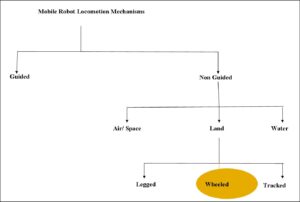
Make sure you are comfortable moving back and forth among your slides. Do not cross the time limit. Add photographs of any field visits for data collection , or conference presentations in your presentation slides. If you had any interactions with domain experts in your area then add interaction details with a date. If you have visited any organization as a resource person relating to your Ph.D. work with your supervisor then add that details.
Seek advice from your committee members during the meeting. Note down all the suggestions by yourself or ask one of your research colleagues to note the same. This is highly desirable, almost to the point that you should make it mandatory. Give a timeline of your plans. What will you be doing over the next month, and what do you hope to accomplish before your next meeting in the next six months’ time.
Keep additional slides along with your regular slides. Get into additional slides detail if any clarifications are sought on any equations or algorithms etc.
Additional slides can be presented as follows:
i) The equipment details you are planning to purchase or currently using for implementation.
ii) The Algorithms which you have implemented or planning to implement.
iii) The mathematical model you have developed, or
iv) Any slides that you think are important but do not have time to cover at the end of your presentation.
Here are some tips regarding the presentation, including time management, devices, backup, laptop usage, uploading PowerPoint, video, and audio:
- Practice your presentation beforehand to ensure it fits within the allocated time.
- Use a timer or stopwatch during practice sessions to gauge your pace.
- Be mindful of the time during the actual presentation and make necessary adjustments to stay on track.
- Ensure your laptop or presentation device is in good working condition.
- Carry a backup copy of your presentation on a USB drive or cloud storage.
- Test the compatibility of your presentation files with the equipment at the presentation venue in advance.
- Close any unnecessary applications or notifications on your laptop to avoid distractions.
- Disable sleep mode or screensavers to prevent interruptions during the presentation.
- Familiarize yourself with the laptop’s function keys or shortcuts for adjusting display settings, volume, etc.
- Save your PowerPoint presentation in a compatible format (e.g., PPT or PPTX).
- Verify that all embedded media (images, videos, audio) are properly linked and functional.
- If possible, upload your presentation to the venue’s computer system before the session to avoid last-minute technical issues.
- Check the audio and video components of your presentation beforehand to ensure they work properly.
- If you plan to play a video, ensure it is in a compatible format and smoothly integrated into your presentation.
- Test the sound levels to ensure audibility for everyone in the room.
Additional tips (from personal experience):
- Rehearse your presentation multiple times to build confidence and familiarity with the material.
- Prepare cue cards or key points to refer to if needed, but avoid excessive reliance on them.
- Maintain eye contact with the audience to engage them and convey confidence.
- Speak clearly and project your voice to ensure everyone can hear you.
- Use visual aids and diagrams to enhance understanding and clarify complex concepts.
- Incorporate storytelling or real-life examples to make your presentation more engaging.
- Practice smooth transitions between slides and maintain a logical flow throughout.
- Be prepared to answer questions and engage in discussions following your presentation.
Remember, the more prepared and confident you are, the better you can deliver your presentation effectively.
After the PhD Progress Presentation Meeting

End your PhD progress committee meeting with a summary of what you have discussed, common points that you have reached and an action plan for the next six months. Your action plan needs to have “actionable” items, specifically what milestones you will work towards after the meeting and approximate timelines.
A written summary of the PhD progress committee meeting will be prepared by the supervisor and the committee, and that will be sent to the University. You will receive a copy of this and a copy will be placed in your research file.
Send an email note to each of your committee members through your supervisor to thank them for their time, and summarize the action items or milestones you agreed to. This will give your committee members another chance to give you feedback or suggestions.
During the meeting, you might have accepted to complete some implementation before the next meeting, but you may run out of time or you may not get any ideas regarding implementation. In such situations, have a discussion with your supervisor and the committee members and discuss the challenges faced by you. They may either extend the implementation time or ask you to change the methodology of implementation.
Simply do not wait for suggestions from committee members till the next PhD progress presentation meeting. In order to build trust between you and your committee members, you need to take committee members and your supervisor into confidence before taking any major decisions.
In the meeting, the committee might have suggested publishing your work in a quality conference or journal for better citations. Selecting a reputable journal and avoiding predatory conferences and journals is crucial for maximizing the visibility and impact of your research article.
By publishing in a respected journal, you increase the likelihood of attracting a broader and more qualified readership, thus increasing the chances of your article being cited by other researchers. Choosing the right journal involves considering factors such as the journal’s scope, target audience, impact factor, indexing in reputable databases, peer-review process, and overall reputation in the field.
Additionally, it is important to stay vigilant and avoid predatory conferences and journals that may engage in unethical practices or lack rigorous peer-review processes. These predatory outlets may hinder the credibility and recognition of your work. By carefully selecting a reputable journal, you position your research for greater exposure, credibility, and citation potential.
Visit my articles on ” How to identify and avoid predatory conferences and journals ” and “ Identifying Reputable journals for your research paper “. These articles will help you in getting your articles cited by many authors.
Here is an email template which you can communicate to your doctoral committee members in case you fail to keep the deadline or are unable to work on the ideas you proposed. Please take consent from your supervisor before sending any communication to Doctoral Committee members.
Improving both oral presentation and visual presentation skills is crucial for effective communication. To enhance your oral presentation skills, focus on aspects such as clarity, organization, and delivery. Practice speaking clearly, using appropriate tone and volume, and engaging with your audience. Additionally, consider refining your body language, utilizing effective gestures, and maintaining eye contact. For further guidance and resources on honing your oral presentation skills, you may explore reputable platforms and online courses available in this domain.
When it comes to visual presentation skills, it is essential to create visually appealing and impactful slides or visuals. Pay attention to design elements, such as color schemes, fonts, and layout, to ensure coherence and readability. Utilize visuals, such as graphs, charts, and images, to convey information effectively. Incorporate appropriate animations or transitions to enhance the flow and engagement of your presentation. To access valuable tips, techniques, and tools for enhancing your visual presentation skills, you can explore recommended platforms and tutorials available online.
If you are interested in further developing your oral presentation skills, I recommend checking out this comprehensive course on oral presentation skills . It covers essential techniques, strategies, and practical exercises to help you deliver impactful presentations confidently. Likewise, if you want to enhance your visual presentation skills, you may find this resource on v isual presentation design highly beneficial. It provides valuable insights, best practices, and examples to create visually stunning and effective presentations. Feel free to explore these resources to elevate your presentation skills and captivate your audience.
Presenting your PhD progress report to the doctoral committee can be a daunting task, but it is an essential part of your PhD journey. The committee is there to provide guidance and support, ensuring that you are on track to complete your dissertation within a reasonable time. It is crucial to approach the committee meeting with a positive attitude and view it as an opportunity to receive productive advice for your future research.
Remember that the presentation of the progress report to the committee happens in three stages: before, during, and after the meeting. The preparation of the report should be meticulous and thoughtful, and during the meeting, you should be open to constructive feedback and suggestions. After the meeting, you should take note of the committee’s recommendations and use them to shape your future research endeavours.
As you move forward in your career, the support and guidance of the doctoral committee will likely continue to be a valuable resource. By effectively presenting your progress report to the committee, you can make the most of this opportunity and receive the guidance you need to succeed in your PhD program.
Frequently Asked Questions
Research Objective: Clearly state the objective of your research and the problem you are addressing. Methodology: Provide a brief description of the methodology or approach you are using to conduct your research. Key Findings: Highlight the major findings or results you have obtained so far in your research. Progress Update: Summarize the progress you have made during the past six months, highlighting significant achievements or milestones reached. Challenges: Briefly mention any challenges or obstacles you have encountered in your research and how you are addressing them. Future Plans: Outline your planned next steps and future goals for your research, including anticipated timelines or milestones. Relevance and Impact: Discuss the relevance and potential impact of your research in your field or discipline. Support Needed: Specify any specific support, resources, or expertise you require to further advance your research.
To effectively demonstrate a software-based project during the presentation: Have the demo prepared and functional Show a video demonstration if the software is not available or requires specific conditions Focus on showcasing key features and functionalities Provide context and explain the purpose of the software
Include only the necessary level of detail in the background section of your presentation, focusing on what is directly relevant to your research and the specific objectives you will be discussing. Keep it concise and provide enough context to help the doctoral committee members to understand the significance and motivation of your work without delving into unnecessary details.
Maintain open and regular communication with your supervisor throughout the research process. Share progress updates, challenges, and findings with your supervisor in a timely manner. Discuss any potential issues or deviations from the original plan as soon as they arise. Seek feedback and guidance from your supervisor at various stages of your research. Keep your supervisor informed about any changes in methodology, data, or results. Address any concerns or questions from your supervisor before the committee meeting to align expectations.
The types of questions you can expect from committee members regarding your research plan may include: Clarification questions seeking a deeper understanding of your research objectives, methodology, or proposed experiments. Questions about the theoretical framework or literature review supporting your research. Inquiries about the feasibility and potential limitations of your proposed research. Questions related to the significance and impact of your research in the field. Suggestions for alternative approaches or methodologies to consider. Questions about the expected timeline and milestones for your research. Inquiries about potential ethical considerations or data management strategies. Questions exploring the potential implications and practical applications of your research. Requests for additional details or explanations on specific aspects of your research plan. Questions about the expected contributions of your research to the existing body of knowledge in your field.
When responding to suggestions and feedback given by the committee members during the meeting: Listen actively and attentively to understand the suggestions and feedback. Thank the committee members for their input and valuable insights. Remain open-minded and receptive to different perspectives and ideas. Clarify any points of confusion or seek further clarification, if needed. Acknowledge the validity of the suggestions and show a willingness to consider them. Provide thoughtful responses that demonstrate your understanding of the suggestions. Clearly articulate your rationale if you choose not to implement a specific suggestion. Engage in constructive discussions and ask follow-up questions, if appropriate. Demonstrate your ability to integrate feedback into your research plan or adjust your approach. Express gratitude for the committee members’ support and guidance throughout the process.
Lack of Clear Objectives: If your progress presentation fails to clearly define and articulate the objectives of your research, it may be rejected. The committee expects a clear understanding of what you aim to achieve and the significance of your research goals. Inadequate Progress: Insufficient progress made during the specified period can lead to rejection. The committee expects tangible advancements in your research within the given timeframe. If there is a lack of substantial work or limited progress, they may question the feasibility or dedication to your research. Methodological Issues: If there are flaws in your research methodology or data collection techniques, the committee may reject your progress presentation. It is essential to demonstrate a robust and well-designed research approach that aligns with the requirements of your field. Poor Presentation Skills: Your presentation skills play a crucial role in conveying your research effectively. If your presentation lacks clarity, coherence, or fails to engage the audience, it may lead to rejection. Effective communication and the ability to present complex ideas in a concise and understandable manner are vital. Inadequate Literature Review: A comprehensive literature review is expected in a progress presentation. If your review of existing literature is incomplete, lacks depth, or fails to address relevant studies, your presentation may be rejected. It is essential to showcase a thorough understanding of the existing research and its relationship to your work. Failure to Address Committee Feedback: If you neglect to incorporate previous feedback and suggestions from the committee, it may result in rejection. The committee expects you to demonstrate the ability to reflect on and address their recommendations, showing your commitment to improving your research. Remember, the specific parameters for rejection may vary depending on your academic institution and the expectations set by your doctoral committee. It is crucial to consult your supervisor and committee members for clear guidelines and expectations for your progress presentation.
Upcoming Events
- Visit the Upcoming International Conferences at Exotic Travel Destinations with Travel Plan
- Visit for Research Internships Worldwide

Leave a Reply Cancel reply
You must be logged in to post a comment.
Recent Posts
- Understanding UGC CARE Journals: A Comprehensive Guide
- Top 10 AI-Based Research Paper Abstract Generators
- EditPad Research Title Generator: Is It Helpful to Create a Title for Your Research?
- Are Postdoctoral Fellowships Taxable? A Guide to Understanding Tax Implications
- How to Get Off-Cycle Research/Academic Internships
- All Blog Posts
- Research Career
- Research Conference
- Research Internship
- Research Journal
- Research Tools
- Uncategorized
- Research Conferences
- Research Journals
- Research Grants
- Internships
- Research Internships
- Email Templates
- Conferences
- Blog Partners
- Privacy Policy
Copyright © 2024 Research Voyage
Design by ThemesDNA.com


- Notices(PhD)
- PhD Students
- PhD Fee Structure
- Phd Regulation 2023
- Phd Regulation 2019
- Phd Regulation 2017
- PhD Old Regulations
- Registration Form
- Online Thesis Submission
- Guidelines for Post-doctoral Research
- CRPI guidelines
- CRPI: Institute Names
RESEARCH ADVISORY COMMITTEE (PhD Students)
6.1 There shall be a Research Advisory Committee (RAC), or its equivalent body for similar purpose as defined in the Statutes of the University for each Ph.D. scholar. The RAC shall have the following responsibilities:
(1) To review the research proposal and finalize the topic of the research.
(2) To guide the research scholar to develop the study design and methodology of research, and
(3) To periodically review and assist in the progress of the research work of the research scholar in every six month duration.
6.2 A research scholar shall appear before the Research Advisory Committee (RAC) once in six months to make a presentation of the progress of his/her work for evaluation and further guidance.
About Presidency
- Introducing the University
- Best Practices
- Institutional Development Plan
- Vision & Mission
- Code of Conduct (Employees)
- Students' Manual
- Organisation Structure
- Presi200 Song
Quick Links
- Value Added Courses
- Announcement
- People Search
- Conferences & Seminars
- Annual Report
- Prevention of Caste based discrimination
- Institute of Health Sciences
- Grievance Redressal Cell
- Examinations
- Dean of Students Corner
- Career Counselling
- International Students
- Student Grievance Redressal Committee (SGRC)
- Internal Committee for Persons with Disabilities
- Equal Opportunity Cell
- Anti-Ragging
- Internal Complaints Committee (ICC)
- Gender Sensitization and Prevention of Sexual Harassment Cell(GSPSHC)
How to Find Us


Composition of Research Advisory Committee is as follows:
- Two subject experts of whom at least one must be from outside the University
- Supervisor as convener
Responsibilities of Research Advisory Committee:
- To review the research proposal and finalise the topic and title of research.
- To guide the research scholar to develop the study design and methodology of research and identify the course(s) that he/she may have to undergo.
- To periodically review and assist in the progress of the research work of the research scholar.
- A research scholar shall appear before the RAC once in six months to make a presentation of the progress of his/her work for evaluation and further guidance. The progress reports shall be submitted by the RAC to the DRC with a copy to the research scholar every six months; and
- In case, the progress of the research scholar is unsatisfactory, the RAC shall record the reasons for the same and suggest corrective measures. If the research scholar fails to implement these corrective measures, the RAC may recommend to the BoR through the DRC with specific reasons for cancellation of the registration of the research scholar.
- Back to Ph.D. Programme
Ph.D. Programme Governance
- Board of Research (BoR)
- Departmental Research Committee (DRC)
- Research Advisory Committee (RAC)
- Computer Science
- Xavier Law School
- Commerce & Management
- Xavier Business School
- Mass Communication
- Social Work
Other Links
- Examination
- Recruitment
- Scholarship
- Upcoming Events
- About The University
- Radical Prayer

Park Street Office

Princeton Correspondents on Undergraduate Research
How to Make a Successful Research Presentation
Turning a research paper into a visual presentation is difficult; there are pitfalls, and navigating the path to a brief, informative presentation takes time and practice. As a TA for GEO/WRI 201: Methods in Data Analysis & Scientific Writing this past fall, I saw how this process works from an instructor’s standpoint. I’ve presented my own research before, but helping others present theirs taught me a bit more about the process. Here are some tips I learned that may help you with your next research presentation:
More is more
In general, your presentation will always benefit from more practice, more feedback, and more revision. By practicing in front of friends, you can get comfortable with presenting your work while receiving feedback. It is hard to know how to revise your presentation if you never practice. If you are presenting to a general audience, getting feedback from someone outside of your discipline is crucial. Terms and ideas that seem intuitive to you may be completely foreign to someone else, and your well-crafted presentation could fall flat.
Less is more
Limit the scope of your presentation, the number of slides, and the text on each slide. In my experience, text works well for organizing slides, orienting the audience to key terms, and annotating important figures–not for explaining complex ideas. Having fewer slides is usually better as well. In general, about one slide per minute of presentation is an appropriate budget. Too many slides is usually a sign that your topic is too broad.

Limit the scope of your presentation
Don’t present your paper. Presentations are usually around 10 min long. You will not have time to explain all of the research you did in a semester (or a year!) in such a short span of time. Instead, focus on the highlight(s). Identify a single compelling research question which your work addressed, and craft a succinct but complete narrative around it.
You will not have time to explain all of the research you did. Instead, focus on the highlights. Identify a single compelling research question which your work addressed, and craft a succinct but complete narrative around it.
Craft a compelling research narrative
After identifying the focused research question, walk your audience through your research as if it were a story. Presentations with strong narrative arcs are clear, captivating, and compelling.
- Introduction (exposition — rising action)
Orient the audience and draw them in by demonstrating the relevance and importance of your research story with strong global motive. Provide them with the necessary vocabulary and background knowledge to understand the plot of your story. Introduce the key studies (characters) relevant in your story and build tension and conflict with scholarly and data motive. By the end of your introduction, your audience should clearly understand your research question and be dying to know how you resolve the tension built through motive.
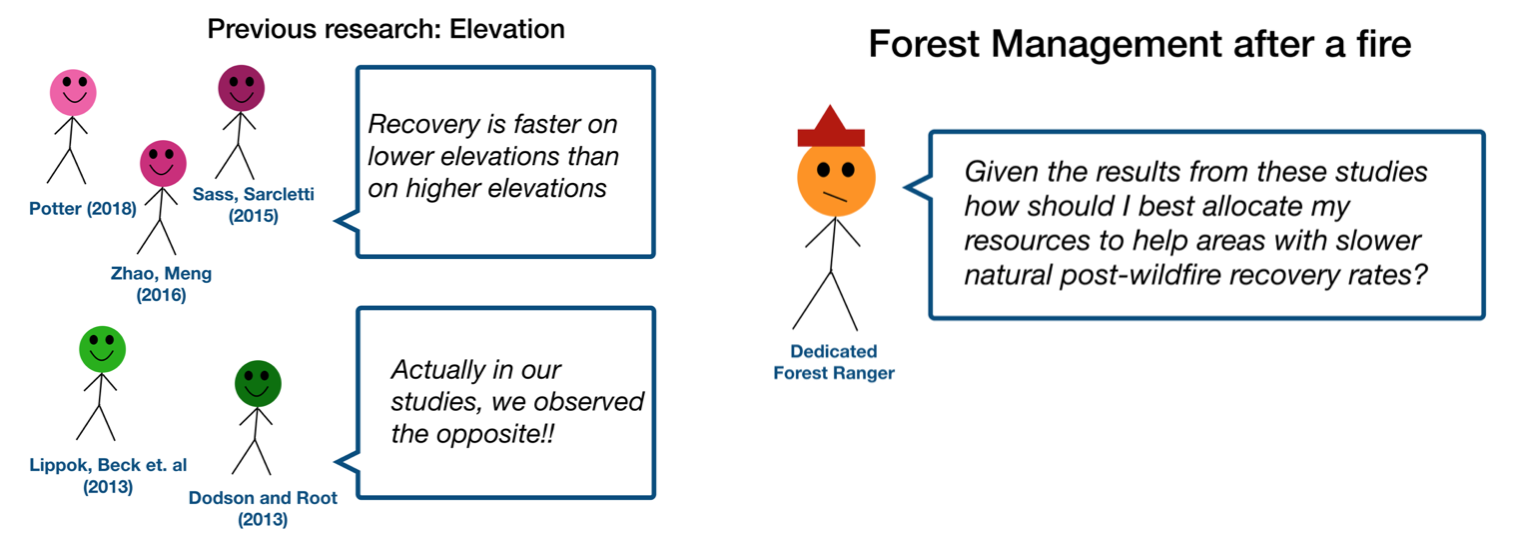
- Methods (rising action)
The methods section should transition smoothly and logically from the introduction. Beware of presenting your methods in a boring, arc-killing, ‘this is what I did.’ Focus on the details that set your story apart from the stories other people have already told. Keep the audience interested by clearly motivating your decisions based on your original research question or the tension built in your introduction.
- Results (climax)
Less is usually more here. Only present results which are clearly related to the focused research question you are presenting. Make sure you explain the results clearly so that your audience understands what your research found. This is the peak of tension in your narrative arc, so don’t undercut it by quickly clicking through to your discussion.
- Discussion (falling action)
By now your audience should be dying for a satisfying resolution. Here is where you contextualize your results and begin resolving the tension between past research. Be thorough. If you have too many conflicts left unresolved, or you don’t have enough time to present all of the resolutions, you probably need to further narrow the scope of your presentation.
- Conclusion (denouement)
Return back to your initial research question and motive, resolving any final conflicts and tying up loose ends. Leave the audience with a clear resolution of your focus research question, and use unresolved tension to set up potential sequels (i.e. further research).
Use your medium to enhance the narrative
Visual presentations should be dominated by clear, intentional graphics. Subtle animation in key moments (usually during the results or discussion) can add drama to the narrative arc and make conflict resolutions more satisfying. You are narrating a story written in images, videos, cartoons, and graphs. While your paper is mostly text, with graphics to highlight crucial points, your slides should be the opposite. Adapting to the new medium may require you to create or acquire far more graphics than you included in your paper, but it is necessary to create an engaging presentation.
The most important thing you can do for your presentation is to practice and revise. Bother your friends, your roommates, TAs–anybody who will sit down and listen to your work. Beyond that, think about presentations you have found compelling and try to incorporate some of those elements into your own. Remember you want your work to be comprehensible; you aren’t creating experts in 10 minutes. Above all, try to stay passionate about what you did and why. You put the time in, so show your audience that it’s worth it.
For more insight into research presentations, check out these past PCUR posts written by Emma and Ellie .
— Alec Getraer, Natural Sciences Correspondent
Share this:
- Share on Tumblr


- Examination
- Pay Fee Online
- News & Events
International Admissions
- e-Notice Board

- Apply for DSAT
- 080 4646 1800
Admissions Helpline
International.

TEMPLATES FOR DC/RAC Meeting
- Checklist To Be Completed By Scholar For RAC Meeting.docx
- ResearchProgressReport - To Be Submitted Before RAC Meeting
- Biannual Research Progress Assessment Report- modification
- Covering Page of Biannual Report for RAC Meeting
- HONORARIUM CLAIM FORM

- The University
- Vision & Mission
- Innovation Labs
IMPORTANT INFORMATION
- Internal Quality Assurance Cell (IQAC)
- DSU University ACT
- Disclosure: Section 4 (1) (b) of RTI Act 2005
- CET Code (B.Tech) - E240
- Comed-K Code - E182
- PGCET Code(M.Tech) - T970
- PGCET Code(MBA) - B365MB
- PGCET Code(MCA) - C520MC
Hostel @ DSU Main Campus
- Hostel Handbook
- Mail id: [email protected] Ph No: +91 - 9606022152
- School of Engineering
- School of Commerce & Management
- School of Basic & Applied Sciences
- School of Health Sciences
- School of Arts, Design And Humanities
- School of Law
- Dr. Chandramma Dayananda Sagar Institute of Medical Education & Research Centre
PROGRAMMES OFFERED
- Under Graduate
- Post Graduate
- Executive Program
PROGRAMS Brochure
- City Campus Brochure
- Main Campus Brochure
- DSAT Brochure
- SoE Brochure
- Mechanical Engineering Brochure
- ECE Brochure
- M.Tech Brochure
- BCA & MCA Brochure
- B.Sc & M.Sc Applied Sciences Brochure
- M.Pharma Brochure
- B.Pharma Brochure
- Pharma.D Brochure
- MPT Brochure
- BPT Brochure
- B.Sc & M.Sc Nursing Brochure
- M.Sc Nursing Brochure
- Allied Health Sciences Brochure
- SoL Brochure
- MBA Brochure
- BBA Brochure
- B.Com Brochure
- Journalism Brochure
- B.Design Brochure
- Admissions details
- DSAT Admissions - Apply Online
- Direct Admissions - Apply Online
- Course Eligibility & Fee Structure

ADMISSIONS HELPLINE
- Phone: 080 46461800
- Phone: 080 49092924 / 25
- E-mail: [email protected] / [email protected]
- DSU School of LAW:
- (3 years & 5 years Programs)
- Mobile: +91 88793 07654
- Phone: 080 46461800 / 080 49092800
- E-mail: [email protected]
- DSU 3 Years LL.B Admissions for School of LAW 2022-23:
- Mobile: 9606484800
- E-mail: [email protected]
- Achievements
- Testimonials

- DSU Main Campus:
- Devarakaggalahalli, Harohalli, Kanakapura Road, Ramanagara Dt., Bengaluru – 562 112 E-mail: [email protected]
- DSU City Innovation Campus:
- Administrative & Main Admission office, Kudlu Gate, Hosur Road, Bengaluru - 560 068 Admissions Helpline: 080 46461800 / 080 49092800 E-mail: [email protected] | [email protected]
- Office of Registrar: 080 4909 2910 / 11 Office of Dean (School of Engineering): +91 80 4909 2986 / 32 / 33 Dean - MBA: 080 4909 2931 Enquiry EMBA: 080 4909 2930 Research Cell: 080 4909 2912 / +91 97390 17462
- DSU City Admissions Office:
- Gate 2, 6th Floor, University Building, Dental Block, Kumaraswamy Layout, Bengaluru - 560111 Admissions Helpline: 080 46461800 / 080 49092800
- E-mail: [email protected] / [email protected] / [email protected]
Theme Colors

PhD Dissertation Defense Slides Design: Example slides
- Tips for designing the slides
- Presentation checklist
- Example slides
- Additional Resources
Acknowledgments
Thank all ph.d.s for sharing their presentations. if you are interested in sharing your slides, please contact julie chen ([email protected])., civil and environmental engineering.
- Carl Malings (2017)
- Irem Velibeyoglu (2018)
- Chelsea Kolb (2018)
- I. Daniel Posen (2016)
- Kerim Dickson (2018)
- Lauren M. Cook (2018)
- Xiaoju Chen (2017)
- Wei Ma (2019)
- Miranda Gorman (2019)
- Tim Bartholomew (2019)
- << Previous: Presentation checklist
- Next: Additional Resources >>
- Last Updated: Jan 9, 2024 11:18 AM
- URL: https://guides.library.cmu.edu/c.php?g=883178

Amanda B. Parrish, PhD, RAC Director, Regulatory Affairs and Quality Erika Segear, PhD, RAC
Oct 30, 2019
190 likes | 203 Views
Office of Regulatory Affairs and Quality. Updates from the Office of Regulatory Affairs and Quality (ORAQ): Regulatory Review Requirements Changes in ORAQ Costs Submission Processes. Amanda B. Parrish, PhD, RAC Director, Regulatory Affairs and Quality Erika Segear, PhD, RAC
Share Presentation
- regulatory affairs
- study teams
- regulatory submissions
- fda regulatory submissions
- research support staff directly

Presentation Transcript
Office of Regulatory Affairs and Quality Updates from the Office of Regulatory Affairs and Quality (ORAQ):Regulatory Review RequirementsChanges in ORAQ CostsSubmission Processes Amanda B. Parrish, PhD, RAC Director, Regulatory Affairs and Quality Erika Segear, PhD, RAC Associate Director, Regulatory Affairs
Office of Regulatory Affairs and Quality ORAQ Background • Regulatory Affairs Group Founded in 2007 • Initiated and supported through Duke CTSA funding • Free and optional resource for the Duke community • Duke faculty not required to utilize services in order to conduct research requiring FDA oversight • First few years included 4 FTEs • Office Growth and Expansion • Study teams worked to support staff by adding effort into grants—developed a model for dedicated support of FTE • Expansion to centralize GMP QA support under ORAQ in 2016 with migration into the School of Medicine • Merged with DCRI Regulatory Services in 2019 • Currently, 28 RA and GMP QA professional staff members
ORAQ Organizational Structure
Office of Regulatory Affairs and Quality ORAQ Mission • ORAQ offers regulatory and quality assurance support in all aspects of clinical research from preclinical requirements to first-in-human studies and beyond. • Our goal is to provide the Duke community with the tools, training, and support needed to navigate the complex regulatory pathways that accompany translational research. We aim to do this by providing support in the following areas: • Early Regulatory Strategy Development • Preclinical Testing and GMP Manufacturing • Regulatory Submissions and Maintenance • FDA Meetings and Inspections • Education and Training • Outreach and Collaboration
Office of Regulatory Affairs and Quality Regulatory Affairs Landscape • Current Numbers: • Over 140 active INDs and 6 active IDEs • Over 155 approved applications (ITPs, ODDs, DMFs) • Approved BLA (marketing application) • SOM Concerns: • About 1/3-2/3 of regulatory submissions do not have any review • Post-hoc errors have been found putting IND/IDE holders at risk or causing delays • Challenge for teams to keep up with changing regulatory landscape • SOM Goals: Improve quality of submissions, decrease regulatory risk, and thwart delays
Office of Regulatory Affairs and Quality New Institutional Review Requirements • Previous Model: • Use of ORAQ for regulatory support is optional. • Proposed Change: • All FDA regulatory submissions associated with a clinical trial (IND/IDE/ITP) will be required to go through ORAQ for review.
Office of Regulatory Affairs and Quality New Institutional Review Requirements • The initial application and/or amendment can still be drafted by the study team, but the submission needs to be reviewed by ORAQ before being sent to FDA. • The submission can be prepared and shipped by the study team, but ORAQ will offer support for this work to aid the study teams with this workload. • ORAQ must obtain a final copy of all submissions and will store in a central repository. • The study team can still serve as the secondary FDA contact, but any formal FDA correspondence (requests for information, etc.) should be shared with ORAQ.
Office of Regulatory Affairs and Quality New Institutional Review Requirements • Timeline: Requirements will be phased in with review of initial/original applications starting November 1, 2019. • Start collecting copies of all submissions at this time. • Obtain information on submission burden and evaluate ORAQ resources. • Review of additional submissions, such as supplements, reports, amendments, etc., will be phased in over a period of one year. We will notify sponsors and research support staff directly when new review requirements go into effect. Up to date information will also be available on our website.
Office of Regulatory Affairs and Quality New Institutional Review Requirements • What is the process for requesting reviews? • Workflows and review processes are in development. • In the next couple of weeks, we anticipate having a service request form available on our website. • Request review of initial/original submissions • Submit copies of all submissions • Website will also outline expectations on ORAQ review times and submission processes.
Office of Regulatory Affairs and Quality Changes in ORAQ Costs • Previous Model: • ORAQ services were no cost to the clinical research community at Duke University. • Proposed Change: • ORAQ will move to a cost recovery model, whereby effort that is not already paid for will be charged back to academic departments or fund codes monthly. • This change was communicated by SOM leadership to Department Chairs in an August 2019 meeting.
Office of Regulatory Affairs and Quality ORAQ Costs • ORAQ’s Service Request Form will contain fields for faculty and/or support staff to self-report department or fund code for charge back. • Collaborative projects will be required to select a primary department or fund code for billing. • This determination will be made by the study team or faculty involved in the project. • Study teams should work with ORAQ to estimate project costs and plan for these costs in grant applications.
Office of Regulatory Affairs and Quality New Submission Processes • Previous Model: • All drug/biologic submissions sent to CDER or CBER for research INDs (i.e., non-commercial INDs) submitted in triplicate on paper and shipped FedEx overnight. • Proposed Change: • All drug/biologic submissions sent to CDER or CBER for research INDs will be submitted electronically through FDA’s Electronic Submissions Gateway in non-eCTD format .
Office of Regulatory Affairs and Quality New Submission Processes • Advantages: • Faster receipt times—submission arrives same day • Less burdensome preparation • More cost effective • Non-eCTD submissions can be converted back to paper if faculty ever leave Duke • Important changes: ORAQ will provide study teams with an electronic copy (merged PDF) of the final submission for record keeping. Hard copies will no longer be provided.
Office of Regulatory Affairs and Quality Additional information
Office of Regulatory Affairs and Quality Additional information • Information on Website • Newsletter Messaging • Emails to Current Regulatory Sponsors • Emails to Research Support Offices • Research Wednesday Presentation (2/26/2020)
Office of Regulatory Affairs and Quality ORAQ Resources • Location: Office of Regulatory Affairs and Quality Duke University – Hock Plaza 2424 Erwin Road, 4th Floor Durham, NC 27705 • Website: http://medschool.duke.edu/ORAQ • Includes new and updated regulatory template documents • Contact information for our staff • Event subscription/Request a Speaker • Additional QA resources • Training Program: [email protected] • Contact for Questions: [email protected]
Office of Regulatory Affairs and Quality Questions/Discussion
- More by User

RAC Foundation
RAC Foundation. Pricing, planning and new technology. Are they alternatives? Sir Christopher Foster RAC Foundation for Motoring 23July 2004 To the Conference on Reducing the Impact of Vehicles on Air and Environment Quality in Cities, Mexico City. Pricing Objectives.
298 views • 16 slides
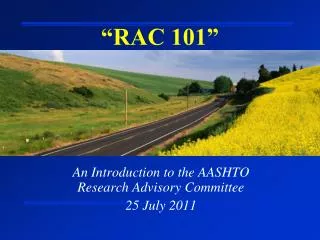
“RAC 101”. An Introduction to the AASHTO Research Advisory Committee 25 July 2011. CURRICULUM. Intro – Skip Mentoring Program – Skip SCOR/RAC web site; new member handbook; resources – Amy Peer Exchanges – Barnie Coop Research Programs – Chris Seven Keys – Gary TRB State Reps – Moy
1.19k views • 101 slides

“RAC 101”. An Introduction to the AASHTO Research Advisory Committee 23 July 2012. CURRICULUM. Intro – Skip Paul Mentoring Program – Skip Paul SCOR/RAC web site; new member handbook; resources – Amy Schutzbach Peer Exchanges – Barnie Jones Coop Research Programs – Chris Hedges
1.08k views • 94 slides

“RAC 101”. An Introduction to the AASHTO Research Advisory Committee 26 July 2010. CURRICULUM. Intro – Skip SCOR/RAC web site; new member handbook; resources – Amy Peer Exchanges – Barnie Coop Research Programs – Chris Seven Keys – Gary TRB State Reps – Moy Mentoring Program – Skip
969 views • 85 slides
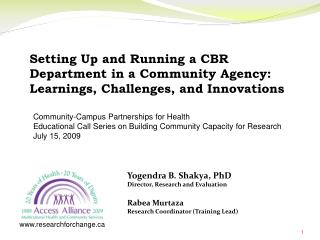
Yogendra B. Shakya, PhD Director, Research and Evaluation
Yogendra B. Shakya, PhD Director, Research and Evaluation. Setting Up and Running a CBR Department in a Community Agency: Learnings, Challenges, and Innovations. Community-Campus Partnerships for Health Educational Call Series on Building Community Capacity for Research July 15, 2009.
208 views • 11 slides

Inside RAC. Julian Dyke Independent Consultant. Web Version. juliandyke.com. Agenda. Introduction to RAC Memory Structures The Buffer Cache Global Cache Services The Library Cache Global Enqueue Services. Introduction to RAC. Node 1. Node 2. Instance 1. Instance 2. Interconnect.
1.23k views • 106 slides
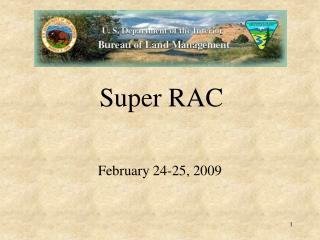
Super RAC. February 24-25, 2009. Items to be Discussed. Coal Program Oil Shale. COAL. 9 mines 7 Underground 2 Surface Production ≈ 22.8 million tons Revenue ≈ $55.38 million. Recent Coal Activities. LBA. New Elk Coal – near Trinidad late 09
316 views • 13 slides

Nicolet RAC
Nicolet RAC. September 12, 2012. Completed Projects. Portable Boat Wash Station has been purchased and being used. Completed Projects. Nicolet State Trail upgrade on Forest Service Land Wabikon Boat Landing Improvement Restoration of Hunter Walking Trail Systems
294 views • 11 slides

Fotula Fegaras, PhD Senior Director, Regulatory Affairs Sanofi Pasteur Limited, Toronto, Canada
The Challenges of Developing, Licensing and Commercialization of New Vaccines - A Global Industry Perspective. Fotula Fegaras, PhD Senior Director, Regulatory Affairs Sanofi Pasteur Limited, Toronto, Canada. What are Vaccines?.
911 views • 45 slides
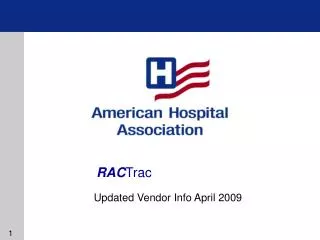
RAC Trac. Updated Vendor Info April 2009. 1. OVERVIEW of AHA RAC Trac. 2. RACTrac Goals. Collect RAC Experience Data to create the AHA RAC Report for Advocacy Purposes Educate the field about trends in RAC audit activity
321 views • 10 slides

Iman Barilero, PhD, PharmD Associate Director, European Regulatory Affairs
Current Regulations and Guidelines in Europe on Approval of Similar Biological Medicinal Products “Biosimilars” Malaysia National Regulatory Seminar Subang Jaya, Selangor, 6-7 September, 2005. Iman Barilero, PhD, PharmD Associate Director, European Regulatory Affairs
587 views • 35 slides

RAC. Recovery Audit Contractor Connolly Healthcare.
639 views • 46 slides

“RAC 101”. An Introduction to the AASHTO Research Advisory Committee 23 July 2012. CURRICULUM. Intro & Mentoring Program – Skip Paul SCOR/RAC web site; new member handbook – Amy Schutzbach Peer Exchanges – Barnie Jones Transportation Pooled Fund Program – Leslie Wright
1.25k views • 109 slides

Erika F Puni, PhD Stewardship Ministries Director General Conference
STEWARDSHIP IS A MATTER OF FAITH. Erika F Puni, PhD Stewardship Ministries Director General Conference. THE BIBILICAL TEXT.
731 views • 15 slides
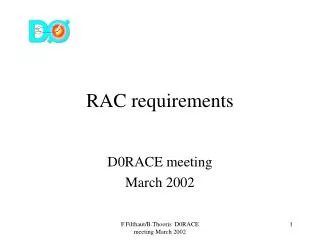
RAC requirements
RAC requirements. D0RACE meeting March 2002. Location issues. Should follow more or less collaborators distribution Locations should be defined to avoid unnecessary network traffic overlap. Network Bandwidths.
167 views • 6 slides

RAC and Shared Storage
RAC and Shared Storage. Objectives. After completing this lesson, you should be able to understand: RAC and shared storage technologies Oracle Cluster File System Automatic Storage Management. RAC and Shared Storage Technologies. Storage is a critical component of grids:
302 views • 15 slides

RAC regulatory affairs certification is another professional certification. If you want to pass the exam in first no need to worry about now. Exams4sure is here for you. You can easily pass the exam. We provide you the best study notes of RAC. We also provide you a demo that will help you in your exam. Our demo is a proof that we are a trust able site and all the questions are approved by the experts. So what are? You waiting for just visit here for complete details: http://www.exams4sure.net/raps/rac-gs-exam-questions-dumps.html
324 views • 16 slides

RAC IT Solutions rent out IT Equipments on flexiblecontract schemes. RAC IT provides services like Networking Equipment, Laptops, Desktops and X-Series servers on rent in India and major cities - Mumbai, Kolkata, Bengaluru, Pune, New Delhi, Chennai and Hyderabad. http://www.racwg.com/servers/
98 views • 7 slides

1.02k views • 101 slides

RAC. Recovery Audit Contractor Connolly Healthcare. ARRA and HITECH: Two Years Later Management Resource Group, LLC & Associates Lunch & Learn Biloxi, Mississippi April 14, 2011.
665 views • 65 slides
PhD Synopsis Writing: 4 questions your committee (RDC/DRC) will definitely ask you
- PhD Synopsis Writing: 4 questions
By Aaron Category : PhD Synopsis
It is important for a PhD candidate to be able to anticipate in advance the kind of questions that will be asked by your committee when you present your proposal.
Before we go forward to figure out which are the most probable questions, you must know what the main reasons behind conducting a RDC are:
- Whether you understand your thesis topic well or not
- what are the reasons behind your thesis topic selection
- Do you have sufficient knowledge of research methodology to apply in your proposed study?
- Are you passionate enough about doing PhD, that you will sustain all the pressure that will come with it?
- Is there novelty in your research topic to generate substantive contribution in research in the coming times to come?
- Does your topic have the longevity to remain useful and interesting to the research community for a long time to come?
You must remember that a PhD viva is an open book exam. Which means that you can bring any material that you wish to for reference and discussion during the process. Make sure that you carry:
- A copy of your well-written synopsis
- The list of probable questions and the best answers that you have prepared for it
- Some key literature references that you have studies before identifying your research gap
- The proposed or standardized questionnaire, if you have one for your study.
Before we discuss the most probable questions, remember that if the RDC asks you a lot of questions, it does not mean that they doubt your topic or potential or they may reject your synopsis. Their purpose is to brainstorm and take out the best version of your research topic. So you must relax and let your ideas flow out in a spontaneous manner. Make sure you give a patient hearing to each of the questions and answer them succinctly but at the same time analytical and sufficiently inclusive.
Some of the most indispensable questions can be:
- In one sentence, describe what your research topic is all about.
- What is original about your topic? How would you ensure its novelty?
- Explain your research design and the reasons behind choosing it.
- What challenges do you anticipate during the process of your PhD and how prepared are you to combat them?
Sometimes if you don’t understand a specific question, it is okay to seek clarification either directly or by paraphrasing the question in your own words and placing it in front of them as, “Is this what you mean?”
Got any suggestions?
We want to hear from you! Send us a message and help improve Slidesgo
Top searches
Trending searches

15 templates

26 templates

49 templates

american history
76 templates

great barrier reef
17 templates

39 templates
PhD Dissertation
It seems that you like this template, phd dissertation presentation, free google slides theme and powerpoint template.
In order to achieve the highest academic degree there is, you need the best presentation for your dissertation. Years of hard work will pay off with this free template by Slidesgo, which can help you focus on your message without having to worry about the visual design.
The color palette is neutral, as it plays with gray, conveying maturity. You’ll find several inspiring pictures with a grayish blue filter, and these come with a nice variety of topics that reinforce the human side of things. Use our slides to place quotes, tables, timelines and graphs to properly display references, data, schedule and statistics. You’ll find it very easy to distribute your text within the composition, and the typography focuses on seriousness and stability. Everyone will soon address you as Doctor!
Features of this template
- A professional presentation template with a minimalist look and inspiring pictures
- 100% editable and easy to modify
- 16 different slides to impress your audience
- Contains easy-to-edit graphics and maps
- Includes 1000+ icons and Flaticon’s extension for customizing your slides
- Designed to be used in Google Slides and Microsoft PowerPoint
- 16:9 widescreen format suitable for all types of screens
- Includes information about fonts, colors, and credits of the free resources used
How can I use the template?
Am I free to use the templates?
How to attribute?
Attribution required If you are a free user, you must attribute Slidesgo by keeping the slide where the credits appear. How to attribute?
Related posts on our blog.

How to Add, Duplicate, Move, Delete or Hide Slides in Google Slides

How to Change Layouts in PowerPoint

How to Change the Slide Size in Google Slides
Related presentations.

Premium template
Unlock this template and gain unlimited access

Register for free and start editing online

IMAGES
VIDEO
COMMENTS
2. In first RAC, all the Ph.D. scholars should bring four (4) hard copies of their research proposal, approved by the research supervisor and, as per the format given at the time of course work. 3. Each scholar should prepare a PowerPoint presentation for RAC meeting. The presentation should cover
How to write and present PhD progress report once in 6 months happening under DRC or RAC research advisory committee panel. With sample presentation video a...
The Presentation of PhD Progress Report to Doctoral Committee Members happens in three stages namely: i) Before the meeting: i.e. Once you start preparing the report for the meeting to till the meeting begins. ii) During the meeting: i.e. From entering into the meeting hall to till the meeting gets over and.
The RAC shall have the following responsibilities: (1) To review the research proposal and finalize the topic of the research. (2) To guide the research scholar to develop the study design and methodology of research, and. (3) To periodically review and assist in the progress of the research work of the research scholar in every six month duration.
Responsibilities of Research Advisory Committee: To review the research proposal and finalise the topic and title of research. To guide the research scholar to develop the study design and methodology of research and identify the course (s) that he/she may have to undergo. To periodically review and assist in the progress of the research work ...
This Guide was created to help Ph.D. students in engineering fields to design dissertation defense presentations. The Guide provides 1) tips on how to effectively communicate research, and 2) full presentation examples from Ph.D. graduates. The tips on designing effective slides are not restricted to dissertation defense presentations; they can ...
Presentations with strong narrative arcs are clear, captivating, and compelling. Orient the audience and draw them in by demonstrating the relevance and importance of your research story with strong global motive. Provide them with the necessary vocabulary and background knowledge to understand the plot of your story.
Learn about the upcoming Dr. RAC meetings and access valuable resources for scholars. Stay informed and engaged with the dynamic research community at DSU. ... Bengaluru Phd admissions Jan/Feb 2024 Announced click here National Anti Ragging Help Line:1800-180-5522 DSU 3 Years LL.B Admissions for School of LAW ...
The RAC/RPC makes the following observations and recommendation: The work done by the PhD Scholar towards the degree of Doctor of Philosophy (PhD) is, as of date: (Please tick ONE of the two options (a) or (b) below). a) Adequate for the submission of the PhD Synopsis, within 60 days. Submission of synopsis is recommended.
PhD Dissertation Defense Slides Design: Example slides. Start; Tips for designing the slides; Presentation checklist; Example slides; Additional Resources; Acknowledgments. Thank all Ph.D.s for sharing their presentations. If you are interested in sharing your slides, please contact Julie Chen ([email protected]).
I started my career as a staff scientist at NIH, working in basic biology and applied science in gene therapy. After patenting some of my inventions, I trained in intellectual property and licensing processes where I realized the importance of regulatory affairs in biomedical products. My next job, managing more than 50 global clinical trials sponsored by US govt, helped be gain experience in ...
Amanda B. Parrish, PhD, RAC Director, Regulatory Affairs and Quality Erika Segear, PhD, RAC An Image/Link below is provided (as is) to download presentation Download Policy: Content on the Website is provided to you AS IS for your information and personal use and may not be sold / licensed / shared on other websites without getting consent from ...
Download now. My PhD thesis presentation slides. 1. Hierarchical information representation and efficient classification of gene expression microarray data PhD candidate: Mattia Bosio Advisors: Philippe Salembier Albert Oliveras Vergés 27/06/2014 Mattia Bosio PhD thesis defense 1. 2.
Education. 1 of 14. Download now. PhD Progress Report July 2018. 1. Progress Report Term 1 :- 29th January 2018 to 29th July 2018 Research Scholar (Ph.D.):- Vaidehi Hariyani Date:- 15/7/2018 Guide:- Dr.Dilip Barad Department of English,MKBU. 2. Topic of Research "Contemporary Retellings of Ramayana Myth; In Search of New Cultural Meaning.". 3.
It is important for a PhD candidate to be able to anticipate in advance the kind of questions that will be asked by your committee when you present your proposal. Before we go forward to figure out which are the most probable questions, you must know what the main reasons behind conducting a RDC are:
It is mandatory for part-time PhD students to meet their Research Supervisor at-least once a week for discussions. Any change in the mode of PhD programme (Full-Time to Part Time or Part-Time to Full-Time) must be informed to Dean of Research. A letter in this regard has to be formally submitted and approved by Dean of Research.
Free Google Slides theme and PowerPoint template. In order to achieve the highest academic degree there is, you need the best presentation for your dissertation. Years of hard work will pay off with this free template by Slidesgo, which can help you focus on your message without having to worry about the visual design. The color palette is ...
Member Secretary / nominee of the URC. SRC will work as Research Advisory Committee (RAC) as laid down in UGC Ph.D. regulation 2016; Reference 1.The SRC shall also include one Professor, having Ph.D., from the other concerned department/ school in case of interdisciplinary topic of the
10 Ph D RAC Meeting Presentation of Roll No.1934110113-KSVV Prasada Rao - 07-10-2022 (1).ppt - Download as a PDF or view online for free
Committee (RAC) for each Ph.D Student which shall be constituted by the head of the research centre immediately after the admission of the candidate. 1. When the selected candidate is ready with the research proposal and the guide gives the clearance make the presentation before Research Advisory Committee and the external expert along with the ...
View Susie Sonnenschein, PhD, RAC's profile on LinkedIn, a professional community of 1 billion members. Medical Writer at Telos Partners, LLC · Regulatory medical writer with a background in ...
RAC introduction - Download as a PDF or view online for free. Submit Search. Upload. ... This PPT is prepared for VTU-Karnataka, Mtech/PhD Research Methodology syllabus based on C.R. Kothari, Gaurav Garg, Research Methodology: Methods and Techniques, New Age International, 4th Edition, 2018 2.Ranjit Kumar, Research Methodology a step-by-step ...
View PowerPoint Presentation.pdf from RGA 6233 at Northeastern University. Overview in the Canadian context Prepared by Hasnaa Fatehi, PhD, RAC (Devices)- March 2023 PhD in RAC